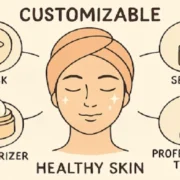Binge eating disorder is the most common eating disorder that doctors diagnose, but many people don’t know it’s a disorder. It causes you to eat a lot of food in one sitting and feel like you can’t stop, even if you want to.
In this article, you will learn what binge eating is in detail and how to fix it effectively.
Let’s have a look!
What Is Binge Eating Disorder?
Binge eating disorder (BED) is a condition where you often eat too much and can’t control it. While it’s normal to overeat sometimes, having this disorder means it happens often and affects your life every day. It can take control of you and harm your mental, emotional, and physical health. So, if you have BED, it is better to get therapy for binge eating. The reason is that therapies are the most suitable option compared to medications.
Symptoms of Binge Eating
There are some reasons for binge eating:
- You eat more food than most people in a short time.
- You eat too much and feel like you can’t lose it.
- You binge eat at least once a week, and it has been happening for a few months.
- You dislike yourself after binge eating.
What Are the Causes of Binge Eating Disorder?
The exact causes of binge eating disorder (BED) are not fully clear.
Several things may increase your risk:
- Genetics: You might be more sensitive to dopamine.
- Gender: BED is more common in women than men. This could be because of biological factors.
- Body image: If you have BED, you might not feel good about your body.
- Emotional trauma: Stressful events, like abuse, losing a loved one, or family problems, can increase your risk for eating disorders.
- Other mental health conditions: If you have BED, you might also have other mental health issues, like anxiety, depression, PTSD, or substance abuse problems.
How to Fix Binge Eating Disorder
Therapies
Common treatments for binge eating disorder (BED) include different types of therapy.
Some of these include:
Cognitive Behavioral Therapy (CBT)
This therapy helps you understand your eating habits, weight, and body image. It teaches you better ways to deal with your problems.
Interpersonal Psychotherapy (IPT)
This therapy figures out the cause of your binge eating and then makes positive changes over time.
Dialectical Behavior Therapy (DBT)
DBT is all about showing you how to handle your feelings. It can help you deal with bad feelings without making you want to binge eat.
Don’t Skip Your Meals
Skipping meals makes you feel hungrier. According to a study, eating just one big meal a day made your blood sugar and hunger levels go up more than if you ate three smaller meals a day.
So, you need to set an eating schedule for yourself and stick to it as much as possible. It can help you control your hunger.
Mindfulness
Mindfulness is about listening to your body and paying attention to how you feel right now. It helps you notice when you’re no longer hungry, so you can stop eating at the right time.
According to studies, mindfulness meditation reduces binge eating and emotional eating. But if you mix it with CBT, it works faster. Plus, you should eat slowly to understand your eating pattern. This would also help you with overeating.
Fiber Rich Diet
Eating more fiber could help you feel less hungry. A small study shows that taking a fiber supplement twice a day for two weeks reduces hunger and calorie intake. That means you should eat whole grains, fruits, veggies, and beans. These foods are full of fiber and can help you feel full longer.
Improve Your Sleeping Pattern
Sleep is very important for your health. It is also connected with BED. According to the study, people with BED have bad sleep. It means that if you’re not getting enough sleep, sooner or later, you can become a victim of BED. So, you should get at least 8 hours of sleep most nights to manage BED.
Bottom Line
Binge eating disorder (BED) is a common problem that can seriously harm your health if not treated. You may eat a lot of food in a short time and feel unable to stop
With BED, you may eat a lot of food in a short time and feel unable to stop, often feeling shame or guilt afterward. This can affect your health, body weight, self-esteem, and mental health in negative ways. In this article, we have discussed tips to manage BED. So, if you’re struggling with this disorder, you must follow the tips mentioned earlier.
Caring Touch Home Health Makes a Difference in Patients’ Lives










Comments